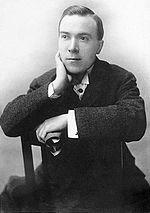Albert Chevalier, Date of Birth, Date of Death
TweetAlbert Chevalier
English music hall comedian and singer
 Date of Birth: 21-Mar-1861
Date of Birth: 21-Mar-1861
Date of Death: 10-Jul-1923
Profession: singer, comedian
Zodiac Sign: Aries 
About Albert Chevalier
- Albert Chevalier born Albert Onésime Britannicus Gwathveoyd Louis Chevalier; (21 March 1861 – 10 July 1923), was an English music hall comedian, singer and musical theatre actor.
- He specialised in cockney related humour based on life as a costermonger in London during the Victorian era.
- Owing to this and his ability to write songs, he became known to his audiences as the "costers' laureate". Born in London, Chevalier showed an interest in entertainment from an early age through his private performances to family and friends.
- He made his debut on the amateur stage when he was eight, performing in Julius Caesar, at the local Cornwall Hall.
- Soon after he joined a local amateur dramatics group before changing his stage name to "Albert Knight". Chevalier joined the music hall circuit in the 1880s and over the decade became very successful.
- His success meant that from the early 1890s he was able to choose which theatres to perform in and often performing at three or four halls each night.
- Together with his brother Charles Ingle he wrote a number of highly successful coster songs to support his act including "Wot cher!, or, Knocked 'em in the Old Kent Road", "The Future Mrs.
- 'Awkins", "Appy 'Ampstead", and the melodrama "My Old Dutch".
- As well as in London, Chevalier became popular with audiences in the English provinces which he toured over the length of his career. During the 1910s Chevalier moved from comedy into music composition for straight plays.
- With a deteriorating health his final appearance was in My Old Dutch at the Lyceum Theatre in 1920.
- The play was based on Chevalier's own song of the same name and had some success.
- The play ran for over a year and Chevalier completed his last performance in November 1922.
- He died aged 62 and was buried in Abney Park cemetery in the same plot as his son and father-in-law George Leybourne.
Read more at Wikipedia

